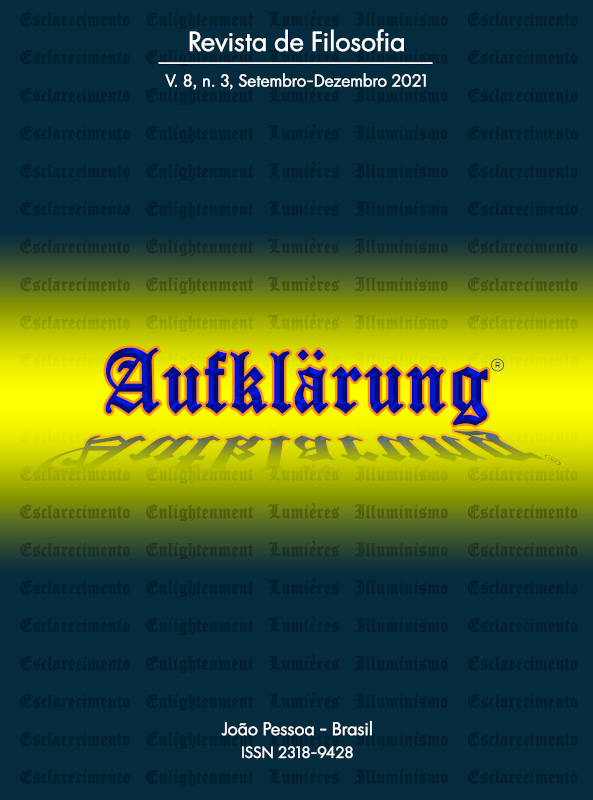Essay on formation and adaptation in Adorno
DOI:
https://doi.org/10.18012/arf.v8i3.57863Keywords:
Formation of subjectivity, Education for adaptation, Autonomous subject, Domination, Operator of scientific knowledgeAbstract
This article evaluates the issue of formation and adaptation in the context of the bourgeois society, as seen under the lights of Theodor W. Adorno’s thinking, (1903-1969), especially in following the texts: Education and Emancipation (1995); Semiculture Theory (1996) and Dialectic of Enlightenment (1985), aiming at exposing the inherent forceful conditions of the capitalist system that validates the exit of man from the tutelage of divine authority, without, however, bestowing upon him effective autonomy, in the Kantian sense, to self-govern. Such a society chooses scientific knowledge, enhanced by technical-instrumental rationality, as the only valid form of knowledge that will forge a type of subjectivity whose thinking that support it is reified. Education is linked to the interests of the capitalist system to train operators of scientific knowledge to produce goods, without considering the critical reflections that it will provoke on life marked by exploitation and inequalities in this dominating society.
Downloads
References
ADORNO, T. W. Educação e emancipação. Trad. Wolfgang Leo Maar. Rio de Janeiro: Paz e Terra, 1995.
ADORNO, T. W.Teoria da semicultura. Trad. Newton Ramos-de-Oliveira; Bruno Pucci e Cláudia Barcelos de Moura Abreu. Revista – Educação e Sociedade, n. 56, ano XVII, dezembro de 1996, pág. 388-411. Disponível em: http://www.primeiraversao.unir.br/atigos_pdf/191_.pdf. Acesso em: 15 de outubro de 2017.
ADORNO, T. WHORKHEIMER, M. Dialética do esclarecimento: fragmentos filosóficos. Trad. Guido Antônio de Almeida. Rio de Janeiro: Jorge Zahar, 1985.
ALTHUSSER, Louis. Ideologia e aparelho ideológico de estado. Lisboa, Editora Presença, s/d.
CHAGAS, E. F. Natureza e liberdade em Feuerbach e Marx. Campinas, Editora Phi, 2016.
DINIZ, Francisco Rômulo Alves. “Herbert Marcuse: ciência, política e sociedade”. In: DINIZ, Francisco Rômulo Alves; AQUINO, J. Alves de; DO CARMO, Luís A. Dias. Princípios: discussões filosóficas. Sobral, Edições UVA, 2005.
DURKHEIM, Èmile. Educação e sociologia. Trad. de Maria de Fátima Oliva do Coutto. São Paulo: Hedra, 2010.
DURKHEIM, Èmile. As regras do método sociológico. Trad. de Paulo Neves. 3 ed. São Paulo: Martins Fontes, 2007.
ENGELS. F. Dialética da natureza. In: MARX, K.; ENGELS, F. Textos sobre educação e ensino, São Paulo: Moraes, 1983.
FEUERBACH, Ludwig. Princípios da Filosofia do Futuro e outros escritos. Trad. Artur Morão. Lisboa: Edições 70, 1988.
GRAMSCI, Antonio. Os intelectuais e a organização da cultura. Rio de Janeiro, Civilização Brasileira, 1989.
KANT, Immanuel. “Resposta à pergunta: que é o esclarecimento?” In: KANT, Immanuel. Textos Seletos (edição bilíngue). Trad. Raimundo vier. 2 ed. Petrópolis: Vozes, 1985.
LUCKESI, Cipriano Carlos. Filosofia da educação. São Paulo, Cortez, 1994.
MAAR, Wolfgang Leo. A guisa da introdução: Adorno e a experiência formativa. In: ADORNO, T.W. Educação e emancipação. Rio de Janeiro: Paz e Terra, 1995.
MARCUSE, Herbert. Ideologia da sociedade industrial. Trad. Giasone Rebuá. Rio de Janeiro, Jorge Zahar, 1967.
MARCUSE, Herbert.Tecnologia, guerra e fascismo. Trad. Maria Cristina Vidal Borba. São Paulo, Unesp, 1999a.
MARCUSE, Herbert. A grande recusa hoje. Trad. Isabel Loureiro e Rosbespierre de Oliveira. Petrópolis, RJ: Vozes, 1999b.
MARX, K. Trabalho assalariado e capital 1. In: MARX, K.; ENGELS, F. Textos sobre educação e ensino, São Paulo: Moraes, 1983.
ZUIN, Antônio A. S.; PUCCI, Bruno; RAMOS-DE-OLIVEIRA, Newton. Adorno: o poder educativo do pensamento crítico. Petrópolis, RJ: Vozes, 1999.
Additional Files
Published
How to Cite
Issue
Section
License

This work is licensed under a Creative Commons Attribution 4.0 International License.
Journal general policy
1.This journal works under a Creative Commons License aplied to online journals. That icence can be read in the following link: Creative Commons Attribution 4.0 International (CC BY 4.0).
2.Accordingly to this License, a)the journal declares that authors hold the copyright of their articles without restrictions, and they can archieve them as post-print elsewhere. b)the journal allow the author(s) to retain publishing rights without restrictions.
Metadata Policy for information describing items in the repository
1. Anyone may access the metadata free of charge at anytime.
2.The metadata may be re-used in any medium without prior permission, even commercial purposes provided the OAI Identifier or a link to the original metadata record are given, under the terms of a CC BY license refered for the Journal.







































